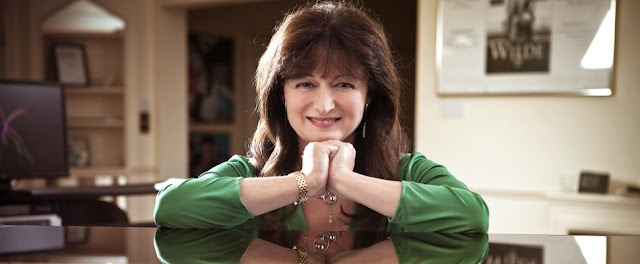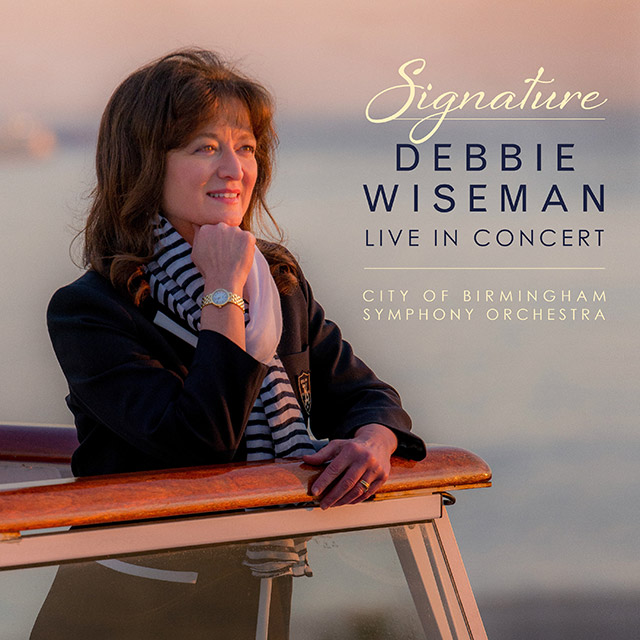Composer Debbie Wiseman, known for her many film and TV scores as well as writing for such occasions as the Platinum Jubilee Pageant and the Coronation, has a new album out. Signature, on Silva Screen Records (issued on 30 June), features a series of new arrangements of her pieces, played by the City of Birmingham Symphony Orchestra (CBSO) with Debbie conducting. There is a diverse mix of music, from film and TV scores, to music from a recent album to accompany Alan Titchmarsh's poems, to music for Royal occasions.
The album came about because earlier this year she had a significant birthday. Approaching this, she was talking to the CBSO and the idea came up for a birthday concert. Then there was a question of what the music would be; she felt it would be lovely to put together a programme of concert suites from film and TV scores plus her occasional pieces and music written as part of her being the composer-in-residence at Classic FM. It turned into a lovely birthday gift, she had the use of the CBSO Centre and a date to record the programme that was just after her birthday. She feels lucky the CBSO wanted to collaborate on the album.
She chose the pieces to be recorded, and this was partly driven by the orchestral line-up. They used an orchestra of just over 40 players; they had to perform pieces that worked with these forces, ruling out some scores. She wanted the disc to be representative of her recent work, but also to be music that the players would enjoy playing. She jokes that it was a bit like Desert Island Discs (she was on the programme in 2014), except she was choosing her own music. The result is representative of a particular moment, significant works that she loved writing.
As well as her film and TV work, Debbie has written quite a bit of occasional music, works for particular ceremonies, many Royal ones. She completely loves doing this, there is the thrill if a piece of music is being written for an occasion, a special occasion. And there was a special thrill to being allocated music in the Coronation service. Last year, she wrote music for the Platinum Jubilee celebrations and it was a exciting to know you were part of it, making a contribution musically, as well as it being an honour to be asked. And she enjoyed the whole process of creating the music.
For the Coronation, she was asked for two Alleluias and she was sent the text, from Psalm 47. She wanted the music to be joyful and celebratory, but it also needed to be fitting. Originally both pieces were written for the Westminster Abbey choir, but there was a last-minute change and she was asked to create one of the pieces for the Ascension Gospel Choir [see YouTube]. She re-thought the music and worked with the singers to create the piece. It was a huge excitement, as well as an honour to be contributing to such a musically stunning occasion.
As she writes for film and TV, I was interested as to whether the process of writing music for a particular occasion differed in any way. In many cases the two are similar, after all for the Coronation she was writing music that responded to the theatre of it all. But with a film, she gets the picture, the dialogue, the story and the sound effects, and her job is to enhance. Sometimes this is to bring out the subtext or set a mood or a place. For instance, in her music for the TV series Wolf Hall, she needed to create a sense of place and used some period instruments, but the music is modern too. In many ways, the actual process of creating the music, whether occasional or for film and TV is the same.
But there is one crucial area where film and TV are different. They are collaborations, there is a director, an editor, and everyone has a say in the music, they all need to like it. The process is for her to play the music to the whole team, and they need to love it! For a stand-alone occasional work, the composer is the sole person in charge. You have performers who are collaborators, but they are at a slightly different level. The musicians want to play for you, to give the best possible performance and it is your job as conductor to help that. But a film director has creative input, the music has to be about story, character and drama; for a stand-alone piece, there is no-one to say 'can we change that?'. For the two pieces for the Coronation, she met with Andrew Nethsingha, director of music at Westminster Abbey and took his advice, but this was a musical conversation rather than a creative one.
She enjoys the collaborations that working in film and TV requires, otherwise, writing music can be very solitary. For her, making music is about such creative collaboration, she likes to discuss and share her music and get feedback, working with creative people. She likes music to have a purpose. Whether it is for film, TV or a special occasion, the music does a particular job and she sees it as her duty to do it as best as she can. She finds this inspiring.
If someone asks her to write music, for a start it is an honour and to bring something to life is hugely rewarding. She calls it the best job in the world, that something scribbled on a piece of manuscript paper a week earlier is suddenly brought to life.
She writes melodically and thinks in pictures, she felt naturally drawn to the film and TV world. Also, the idea of collaboration and writing for a purpose appealed. Her music is naturally thematic and directors love structure and melody. She likes writing tunes and comes up with a melody before anything else, and a melody is a good hook to draw people in.
A college, she was encouraged to write avant-garde music and she needed to find a way into this style. She found Messiaen, the way he drew pictures in his music in an enticing way. She listened to Turangalîla-Symphonie and Catalogue d'Oiseaux; music that drew pictures yet was avant-garde. By the time she left college her music was nothing like Messiaen's but she was drawing pictures in her music. She was influenced by the music of Ennio Morricone and John Williams, by their use of melody. The first film that made her want to write film music was On Golden Pond (Mark Rydell's 1981 film with Katharine Hepburn & Henry Fonda) it begins with a lovely solo piano which draws you in musically. She found it brilliant to be able to do that, it crystallised the idea of writing for film.
She loves simple melodies, you can say so much with just three to five notes, you can set up a mood and draw an audience in. She also feels that in both film and occasional pieces, you should not over-clutter. Students have a tendency to overdo things, to show off techniques, and the audience doesn't want that, they just want the music to be meaningful. Yet simplicity is one of the hardest things to do, to create a melody that does the job. She gets emails from people, saying how they heard some of her music and it inspired them or helped them, and she finds it so rewarding and deeply touching.
 |
| Debbie Wiseman |
Coming up, she has series 11 of Father Brown for the BBC, one of their most successful series, and she has done over 120 episodes, so far. And she is writing the music for the final part of Wolf Hall, the series based on Hilary Mantel's The Mirror and the Light, the third volume of her trilogy based on the life of Thomas Cromwell. The director is Peter Kosminsky (who directed the two previous series) and Debbie has worked on eight or nine films with him With Wolf Hall there were such expectations of the series, as there had been about the novel and then about the theatrical adaptation. She feels that Peter Kosminsky did a remarkable job on the first two series; Hilary Mantel loved the TV adaptation.
The new series will be a very faithful adaptation of the novel with pretty much the same production team as before. But it is a huge job, turning a massive novel into six one-hour episodes. For the music, Debbie will use some themes from the first series but the music will also go in new directions. She is excited to be going into that Tudor world again.
Signature: Debbie Wiseman live in concert - City of Birmingham Symphony Orchestra, Debbie Wiseman - Silva Screen Records (Out on 30 June 2023)
Never miss out on future posts by following us
The blog is free, but I'd be delighted if you were to show your appreciation by buying me a coffee.
Elsewhere on this blog
- Ida revealed: John Wilson & the Orchestra of the Age of Enlightenment take a fresh look at Gilbert & Sullivan's unjustly neglected opera, Princess Ida - opera review
- Terrific and intensely atmospheric: the String Quartet No. 1 and Piano Quintet by Olli Mustonen from the Engegård Quartet and the composer on LAWO Classics - record review
- Because: in a slightly unlikely but completely seductive pairing, countertenor Reginald Mobley is joined by jazz pianist/composer Baptiste Trotignon - record review
- Dennis & Gnasher: Unleashed at the Orchestra: A more than enjoyable event celebrating The Beano with Colin Currie and the BBC Concert Orchestra - concert review
- When all is said and done, his passport simply says that he is a musician: I chat to composer & multi-instrumentalist Richard Harvey about his new disc of choral music - interview
- Reduced forces, but heightened drama: an intimate, chamber production of Wagner's Die Walküre from Regents Opera - opera review
- Style, imagination & not a little daring: a new staging of Handel's Saul at Berlin's Komische Oper - opera review
- No ordinary evening: Christof Loy directs Zandonai's Francesca da Rimini at the Deutsche Oper Berlin with Sara Jakubiak & Jonathan Tetelman - opera review
- The story is 40 years old but nothing much has changed about women's rights in the region: Bushra El-Turk on her opera Woman at Point Zero which comes to Covent Garden next month - interview:
- Regents Opera's new production of Wagner's Die Walküre: a photo essay
- Ein Sommernachtstraum in Essen: Jérémie Rhorer and Le Cercle de l'Harmonie - concert review
- Home













No comments:
Post a Comment